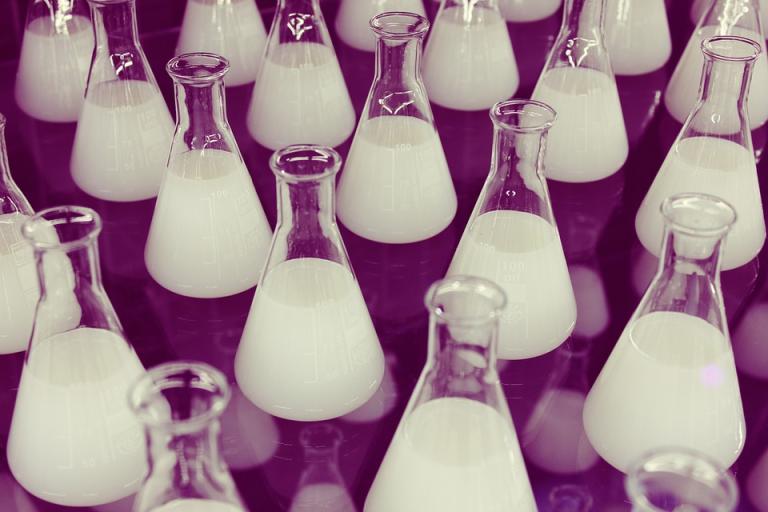
When you expect that scientists have the answers to moral questions.
When you believe that science, after the beginning of the modern era within a discipline at least, has always been always correct and its processes are fool-proof because they have been arrived at with The Scientific Method.
When you believe that science has unlimited ability to invent or explain.
Then you, too, might have made science into a god.
History, and the present day is full of examples of scientists claiming moral expertise, and the citizenry citing their statements as proof. Is cloning moral, or the destruction of embryos necessary to proceed with stem cell research? What about expansive genetic testing of the unborn, and the subsequent systematic abortion of those who are defective? The “mercy killing” of the disabled? What about the forcible sterilization of the poor, in the U.S. or in the Third World? What about experimentation on non-consenting, or non-informed human subjects? Do differences in physical appearance between people of difference races/ethnic groups prove that they are different in their mental capabilities and different treatment is justified? Over the years, scientists have claimed they know the answers to these questions and have called on others to respect their superior knowledge.
And history is also replete with examples of scientists who have been wrong — and, no, I’m not just speaking of medieval astronomers who believed that the earth was the center of the universe. Our narrative is one of consistent forward progress, but the medical field offers us growing numbers of examples of ways that scientists succumb to a herd mentality and are later proven to have been wrong. The development of “bone marrow transplants” as a treatment for breast cancer, which quickly became the mainstream treatment, and only after many years, was proven to have done more harm than good, and this resonates with me because a friend of a friend had such a treatment, and subsequently died. Stents as a standardized treatment for heart attacks are similarly unproven but routine. And even cholesterol-fighting drugs have not proven to be effective at actually reducing heart attacks, just lowering cholesterol. (See here for some details from a book on the topic.) Slate reported not long ago that the “settled science” of the harms of second-hand smoke is not so settled after all. And that’s just what makes its way to us in the press, but it’s my understanding that the same is true in any research field. (And, yes, one might say, “well, but they didn’t follow The Scientific Method,” but that’s part of the point, isn’t it? After all, much of science doesn’t, and can’t, follow The Scientific Method; you can’t, for instance, design an experiment to test the impact of carbon dioxide concentration increases on the earth’s atmosphere, vs. a control “second earth.”)
Many years ago I read a book called The Structure of Scientific Revolutions, summarized here in wikipedia. I was in college at the time, and only vaguely remember it (and one of the things I remember was thinking that paradigm was pronounced “para-dig-m”), and have in mind to re-read it, but I remember it being conceptually very challenging because it disputed the notion of science that we learn as children, that it’s a progression of advancements and, what’s more, that what we now believe, is what is definitively “right.” The idea that, not only have there been “paradigm shifts” in the past, but that there could be another one in the future, a rediscovery that means what we think is true, isn’t, was hard to grasp. Now, whether that upends ideas that we comprehend in our everyday lives, or just, say, physicists’ understanding of “out there” concepts like dark matter, dark energy, string theory, etc., is another question, but it’s still a very different way of perceiving the world.
As to the third point:
Among my friends from high school whose status updates appear on my facebook news feed is one who has moved from Catholicism to atheism. I don’t know her well enough to know when she did so, and she’s got an interesting-ish life story as someone who worked in IT for a number of years, then reinvented herself as a seamstress of custom figure-skating costumes and a commission quilter, but in any case, she likes to share items from atheist websites/blogs and from the site iflscience.com. And one item I remember in particular: a statement that “no matter what happens that might seem to be supernatural, even if I witness what seems to be a miracle before my very eyes, I would never believe that there’s a god, because I know that there’s some science behind it that we just can’t explain yet.”
And you’ve likely read, too, people saying, or writing things like “we could have [fill in invention] today, but the [legacy industry] has blocked it.” General Motors would be producing 50 mpg minivans but they’re in cahoots with ExxonMobil. Big Pharma is blocking a cure for cancer because they make too much money on their existing drugs. Solar energy would be cheaper than coal but a nefarious someone is standing in their way, and so on. This is a conviction that Science is capable of anything if we humans don’t stand in its way. Even the drive for a Universal Basic Income carries with it the assumption that Science will mean that our future world will be so unimaginably automated that we can all kick back and relax.
This is making Science into a god.
And, no, this has nothing to do with climate change research — only with the way some people, on either side, speak about the issue: how often have you heard that there is no place for doubt, and that we can undoubtedly supply all our energy needs with solar? and, on the other side, how often have you heard that, if there is a problem, we can undoubtedly engineer our way out a couple decades hence, with technology that will surely be invented?
Image: Erlenmeyer Laboratory Chemistry Science Flasks, from http://maxpixel.freegreatpicture.com/Erlenmeyer-Laboratory-Chemistry-Science-Flasks-606611












